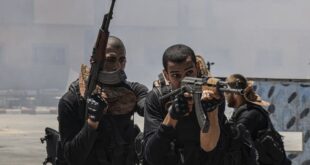Close to 80 senators – including all those running for president -signed a letter calling for greater Arab support for the peace process ahead of the international conference the US is planning for November.
“The success of such a meeting, and ultimately the peace process itself, will depend on the cooperation we receive from the larger Arab world, particularly from those Arab states with close relations with the United States who have not yet signed agreements with Israel,” read the letter, in an apparent reference to Saudi Arabia. It was due to be sent to US Secretary of State Condoleezza Rice later Tuesday.
Israel has been pressing for Saudi representation at the meeting, which so far has no official list of invitees. A Saudi presence is seen as significant because of the legitimacy it would confer on the proceedings in the wider Arab community, as well as provide a boost to Israeli aspirations for normalized relations with its regional neighbors.
The letter also calls for Arab countries to “recognize Israel’s right to exist and not use such recognition as a bargaining chip for future Israeli concessions” and to “pressure Hamas to recognize Israel, reject terror and accept prior agreements, and isolate Hamas until it takes such steps.”
But those very stipulations would derail the effort to get the Saudis on board by setting preconditions and criticizing Saudi efforts at mediation between Fatah and Hamas, the Arab American Institute argued on its Web site.
“As host to the conference, what would the United States gain from setting such preconditions before the parties have even gathered to negotiate?” the Institute asks. “If the goal is for Arab states not to participate in the upcoming conference, this would be the way to go.”
Either way, Saudi participation shouldn’t define the success of the conference, according to a policy paper prepared by former top US officials offering advice ahead of the gathering.
“The Saudi presence at the first meeting would be a critical impetus to the new process, but we are unlikely to know until the last minute whether the Saudis will indeed engage,” write the document’s authors, five former US officials, including three past ambassadors to Israel – Samuel Lewis, Edward Walker and Thomas Pickering. It was also drafted by Steven Spiegel, a national scholar at the Israel Policy Forum, which sponsored the paper.
With these “vague” definitions of success and “widely” differing perception among the various players, the authors write: “The meeting as it stands now seems to be something of a gamble. If it fails, resulting in disappointment and disillusionment, it could further set back the situation in the Middle East.”
They caution that whatever comes out of the meeting will be vulnerable to spoilers such as Syria and Hamas.
“Simply saying no to Hamas without planning for the consequences is a likely ticket to new problems,” they warn of the US and Israeli policy that has shut Hamas out of negotiations and participation in international forums.
They acknowledge, though, that “the most difficult problem in preparing any international meeting and, indeed, in following up on that meeting, will be the role of Hamas.”
To that end and to increase the likelihood of successful implementation, the five former officials suggests immediately planning a second conference, one that could hold out possibility of inviting Hamas should the Islamist group abide by certain principles.
They also suggest intensified diplomatic engagement by someone such as Quartet envoy Tony Blair – characterizing Rice’s brief trips to the Middle East as “critical” but “insufficient” – and that whatever agreement emerges be approved by the UN Security Council.
The State Department did not have an immediate response to either the letter or the position paper.
 Eurasia Press & News
Eurasia Press & News
